There are many reasons that American comics readers should know Garth Ennis, from his long run on Marvel’s The Punisher to his iconic Vertigo Comics series Preacher, to his more recently adapted hit The Boys. However, those who know Ennis best know him also as a writer of war comics, such as War Stories his Battlefields series at Dynamite Entertainment, or his graphic novel Sara at TKO Studios. He’s even infused that influence into his work at Marvel on characters like Nick Fury, most recently in the Vietnam War-set Marvel MAX series Get Fury, co-starring a pre-Punisher-transformation Frank Castle.
More recently, Ennis’ talents as a teller of war tales have served him well while writing stories appearing in British comics anthologies Battle Action and 2000 AD from Rebellion Publishing. In Battle Action, Ennis revived the character Johnny Red, a British fighter pilot leading a Russian Squadron during World War II, leading into the story of Johnny’s final flight. In 2000 AD, Ennis is penning stories featuring Rogue Trooper, the next 2000 AD character set to appear in a film, blending the genre line between war stories and sci-fi.
Videos by ComicBook.com
ComicBook had the opportunity to ask Ennis questions about transitioning from American comics to these storied British magazines, including what he has in store for this year’s 2000 AD Christmas issue. Here’s what he had to say:
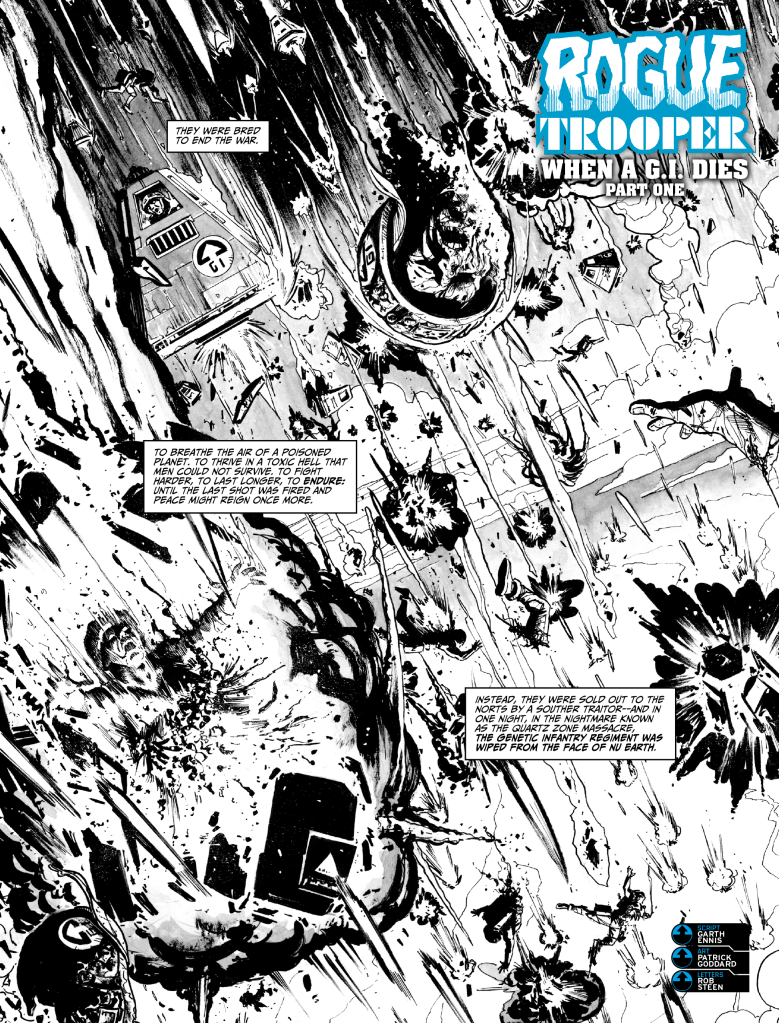
After many years working with US-based publishers, you’ve been doing work for Rebellion for a while now. How has your experience working with Rebellion and on anthologies rather than ~20-page American monthly serials been? Has there been an re-adjustment period at all?
Garth Ennis: Not really, stories are stories. So long as there are competent people at editorial I’m happy to work for anyone, and Oliver Pickles and Matt Smith are among the best I’ve worked with.
I do enjoy the shorter episodes on Battle Action and 2000 AD– less space means more focus, and it’s nice to exercise that particular muscle again. That doesn’t mean I don’t write with the eventual collection in mind- that’s how stories like Rogue Trooper and Johnny Red are going to exist long-term, after all- but there’s still a particular pleasure to be found writing one-offs like Dredger, Hellman, or Strontium Dog/Robo Hunter.
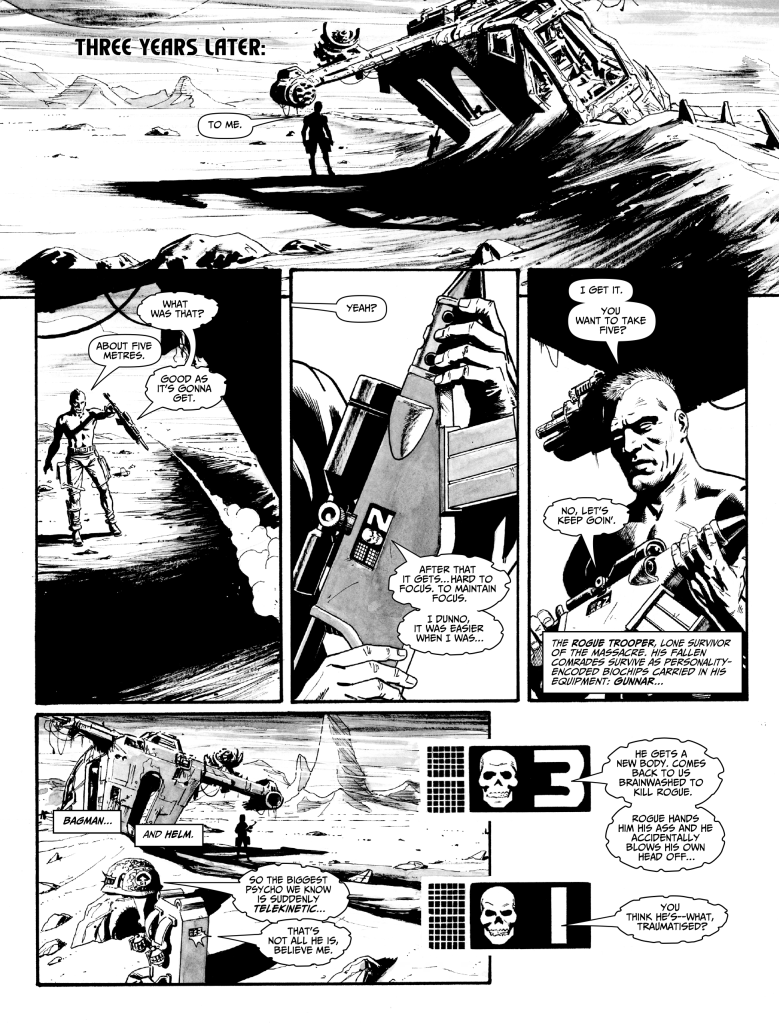
You’ve been writing Rogue Trooper stories in 2000 AD and Johnny Red stories in Battle Action. Both fall into the “war comics” genre, of which you’re considered a master by many, but Rogue and Johnny are very different beasts, the former being sci-fi, and the latter rooted in real history. Have you found they offer unique storytelling opportunities or challenges compared to your other work in the genre? Is there any thematic commonality between them?
Not much beyond the fact that they’re both war stories. Johnny Red has its roots in actual history, as you say, whereas Rogue Trooper is out-and-out science fiction. The latter takes care of itself, with the broad parameters of the strip having been laid down a good forty years ago.
With Johnny Red the hyperbole of ’70s comics means the story is one step removed from my usual war stories; things like Sara or The Stringbags don’t ask the reader to believe in anything that didn’t happen. But there was never an Englishman in command of a Russian fighter squadron, and even if there was, someone with Johnny Redburn’s attitude would have been shot dead by the Soviet authorities inside a couple of weeks.
There’s also a larger-than-life quality to the original strip, with people and aircraft able to do things they simply couldn’t have. What I find interesting is that the old Johnny Red stories got so much right, in terms of setting and events, and finding ways of making the unreal a little more believable in that context is one of the things that keeps me engaged.
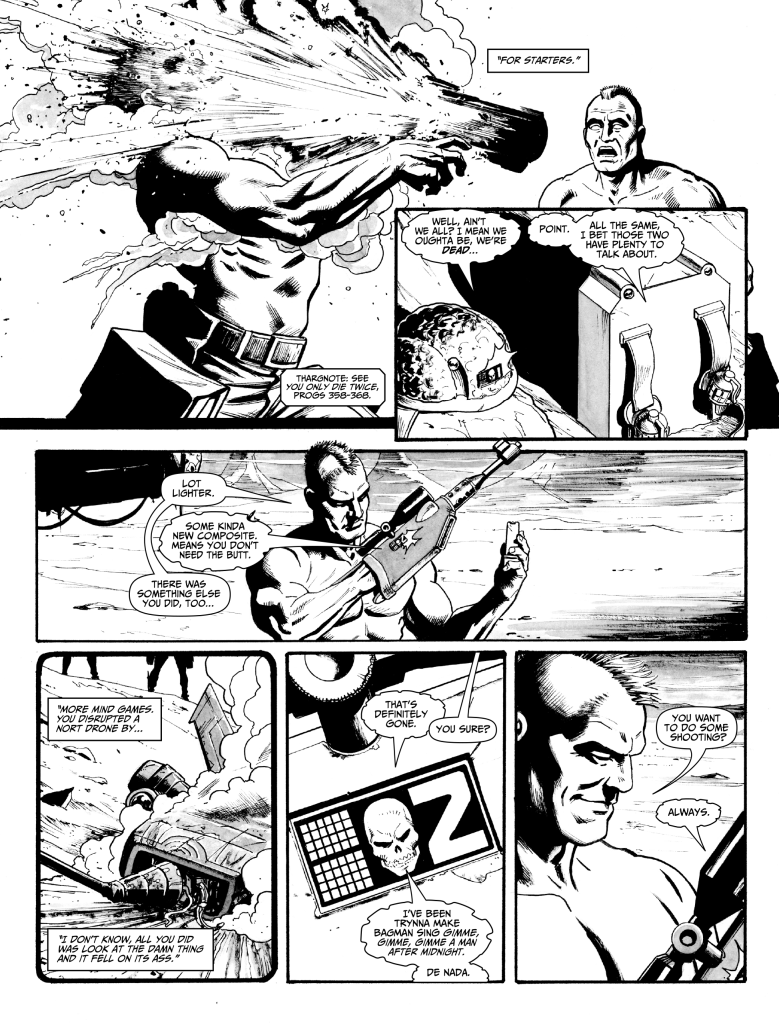
Your current Johnny Red story in Battle Action is being billed as the final Johnny Red story. Given that this is comics, I have to ask what “final” means in this context, but also, what does it mean to you, as a writer, to give such a long-running character that ending?
In the one sense it means nothing; if the strip suddenly became insanely popular, with Hollywood interest and resulting franchise possibilities, then you’d be seeing more material from now ’til doomsday (although a look in my crystal ball tells me this is unlikely). But so long as I have an opportunity to finish the story out in the style I think it deserves, I’ll take it – Johnny Red was my favorite character for a couple of years’ running when I was a kid, and I think some of what Tom Tully, Joe Colquhoun and John Cooper achieved (in what was essentially a boys’ war comic) was extremely impressive.
That said, the second half of that run fell far short of the first, and the actual conclusion – not even written by Tully – was fairly feeble stuff. When I consider how exceptional Johnny Red was in its heyday and how much it meant to myself and so many other readers, I feel the need to give it a proper ending. A good story is a precious thing, and needs to be treated with due care and respect.
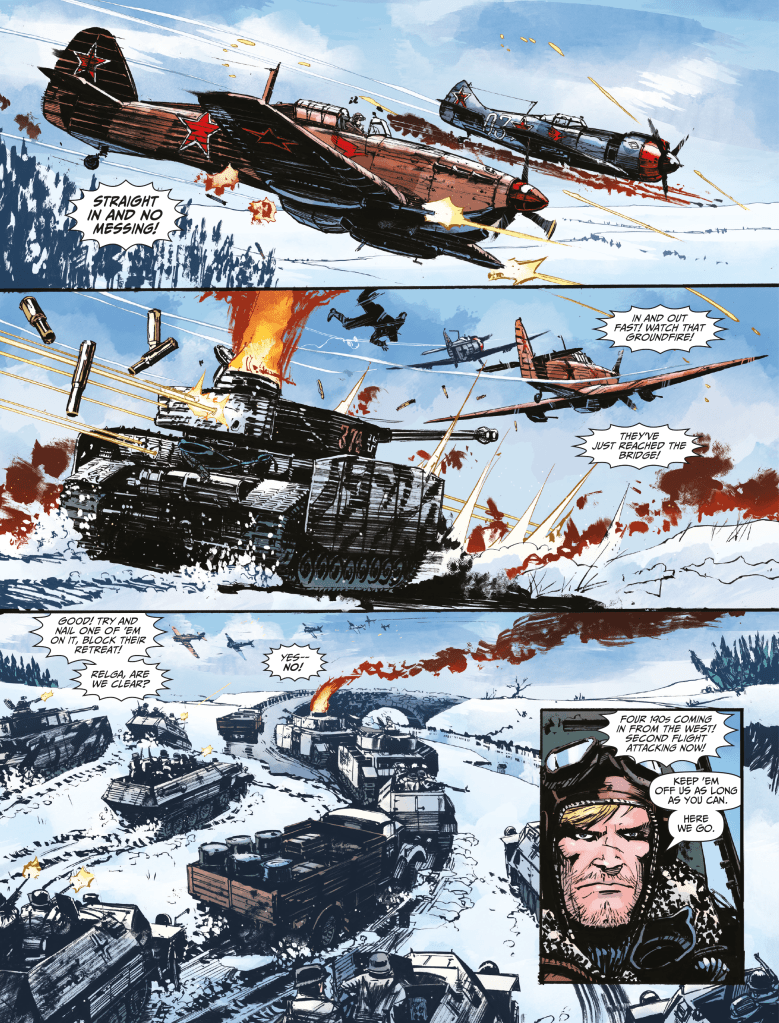
Your current Rogue Trooper story in 2000 AD, “When a GI Dies,” follows your previous story with Patrick Goddard, “Blighty Valley.” What can readers expect from this new Rogue story, and are there any thematic connections between this and last year’s story?
It’s much more specific to the original Rogue Trooper strip, rather than the notion of considering conflict in a wider sense that you saw in “Blighty Valley.” The new one looks at the origins of the Genetic Infantry regiment, their engineering- including the biochips and the implications thereof- and the people on Milli-Com who sent them into combat. It also considers the Dolls, and what they were left with once the dust had settled on the Quartz Zone massacre.
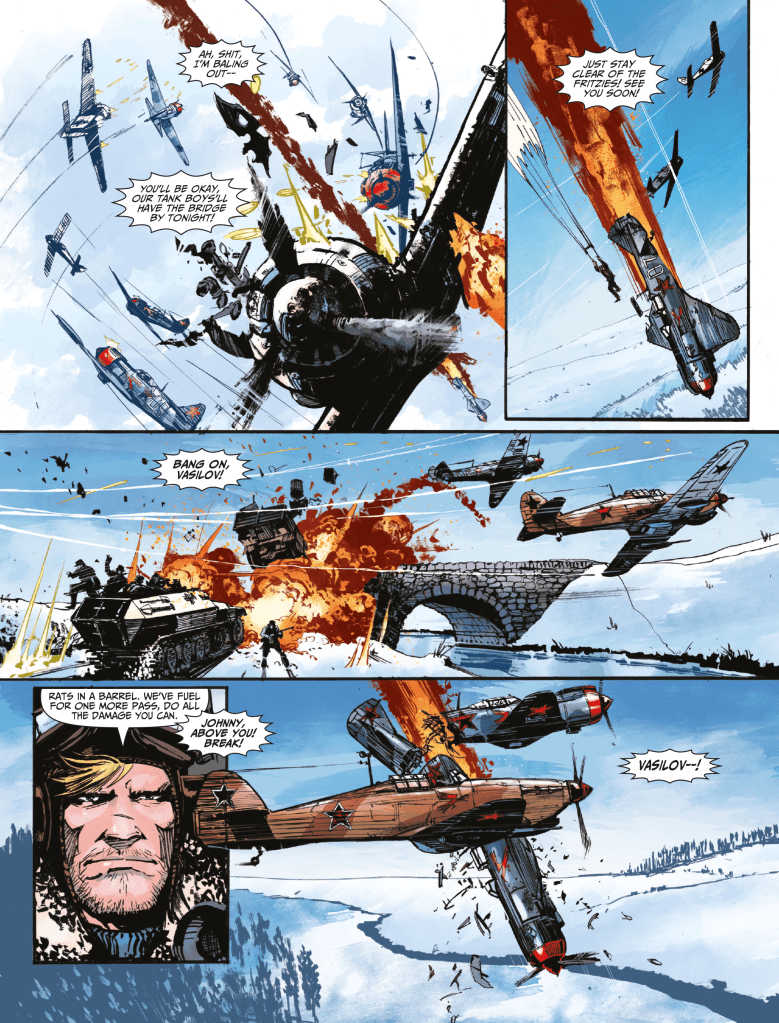
“When a GI Dies” is also a sequel to the classic 1984 Rogue Trooper story “You Only Die Twice.” What made you want to revisit that tale?
It’s one of my all-time favourite Rogue Trooper stories, one of the very best from the classic run- I’d put it up there with “The Marauders,” “Fort Neuro,” “Eye of the Traitor,” etc. Superb Cam Kennedy art on an action-packed story in which the status quo is suddenly turned upside-down- there’s a death and a return, a terrible betrayal, and all sorts of dark hints about what might be going on back on Milli-Com. But having set all this up and then given us so many questions to ponder, the conclusion – epic though it is – gives us precious few answers, and there are no long-term implications as the strip continues, it’s almost as if the events hadn’t happened.
I’ve been thinking about it all these years, largely because it’s so powerful, and I eventually decided that I could get a pretty decent story by coming up with answers of my own.
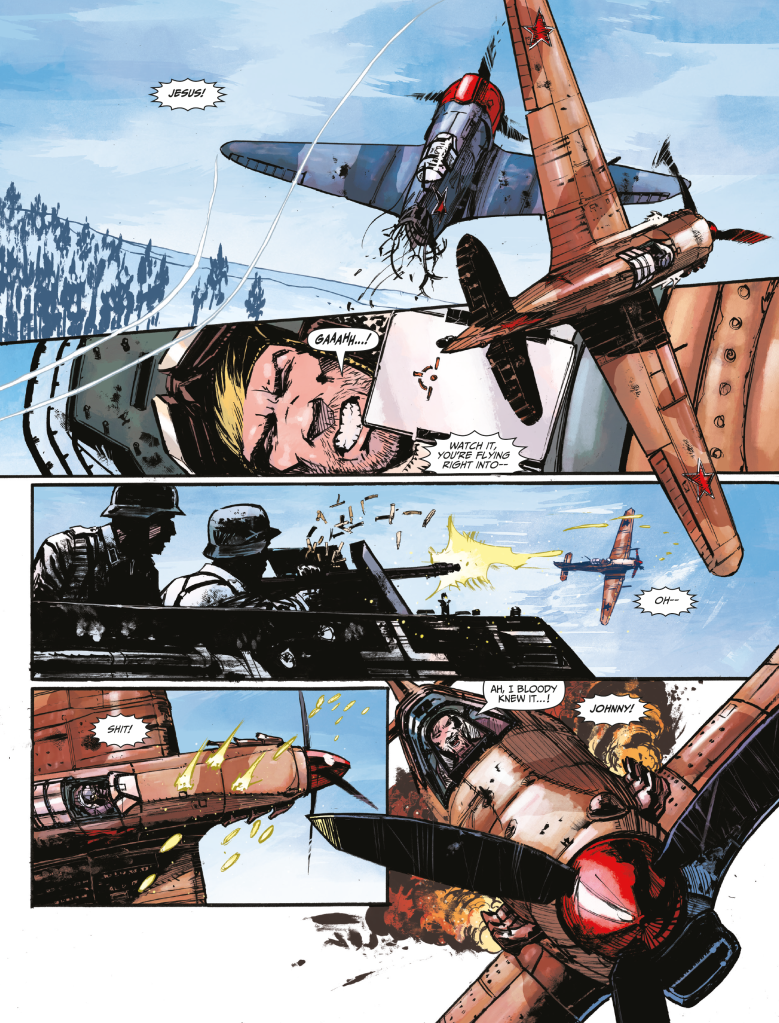
We’ve also just found out that you’re working with Henry Flint on a Strontium Dog story this Christmas. Can you offer any hints as to what that’s about?”
“Doghouse Roses” sees a pair of mutant civilians from Milton Keynes visiting the base of the Search/Destroy Agency, intent on making a fly-on-the-wall documentary about their Strontium Dog heroes. You’ll see all the old favourites- Johnny & Wulf, obviously, but also Middenface, the Torso from Newcastle, Evans the Fist, Spud Murphy, the Stixes and more- but from a point of view that may seem a little unfamiliar.
There’ll also be some odd goings-on in the showers, a CUR prisoner we’d all like to see the back of, and a brief discussion on the future of the ancient English county of Durham. Oh my poor heartses, etc etc.
And Henry is, of course, knocking it out of the park.

